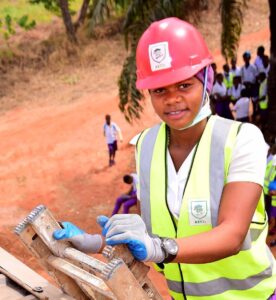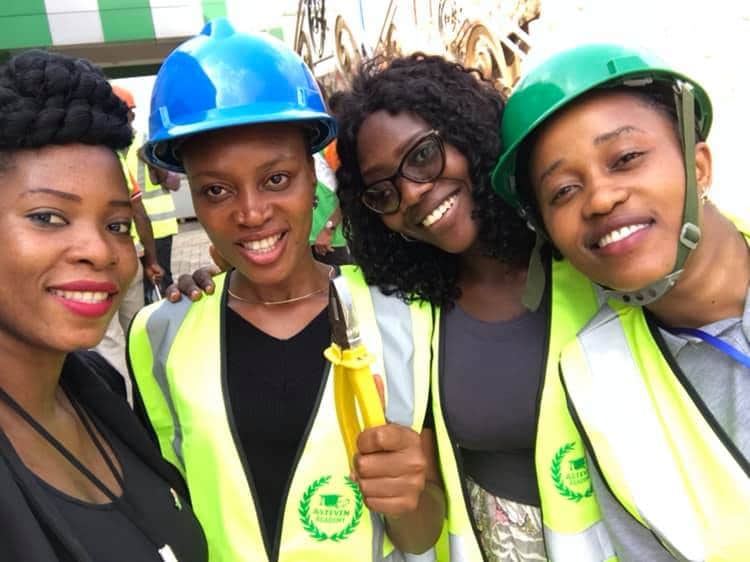Africa’s energy transition and the role of women: an interview with Glory Oguegbu
Glory Oguegbu, Founder and CEO of the Renewable Energy Technology Training Institute, sat down with us to talk about her vision for the energy transition in Africa
Glory Chinenye Oguegbu is the founder and CEO of the Renewable Energy Technology Training Institute (RETTI) and the RETTI Virtual University, which recently launched The Africa Energy Fellowship for Young Energy Leaders.
The fellowship is the latest in a series of initiatives in which Glory embarked on with the mission to train and invest in the next generation of energy leaders who will ultimately contribute to delivering sustainable access to energy and a zero-carbon Africa.
A former recipient of the FSR Lights on Women scholarship, a serial energy entrepreneur, a gender equality ambassador, and a firm believer in the power of renewables, Nigeria-born Glory has sat down with us to talk about her vision for the energy transition in Africa.
Learning by doing, leading by example
Glory volunteered in the National Youth Service Corps for her country (Nigeria), has extensive experience in consulting in the energy sector in Nigeria and Ghana, and has received formal training in both Africa and the US. But where exactly did she have her first encounter with renewables, we ask? It turns out, it wasn’t far from home:
“My passion for renewable energy began after my parents moved to a different part of town in Anambra State part of Nigeria, a quiet community, where they had built their home. Their place didn’t have any electricity – it was completely off the grid. It was 2015 and I had just returned from the US after finishing The Mandela Washington Fellowship for Young African Leaders and having learned about energy and renewables from the books.
It struck me even harder and saddened me to watch my parents struggle with electricity and spend money every day to fuel the generator. It was messy, expensive, not environmentally friendly, and not sustainable. This inspired me to begin the search for a sustainable electricity solution for my parents, sure, but also for those in my community.
Walking around the area I came across a health center with solar panels installed. A brief inquiry revealed that it had stopped functioning a long time before and that the people there were very discouraged – they believed that they had been scammed, that solar did not work.”
Following the episode, Glory came to realize that there were three main issues common to those who are new to the implementation of renewables. First of all, there was a lack of trained workforce, she noted. Second, they were sold faulty products, and third, there was a general lack of awareness of the technology and how to use it – on both the vendors’ and the consumers’ sides.
“Because the installers were not trained, the solar installation at the health facility failed right after. The second issue that people often experience with renewables is that they are sold substandard or counterfeit products. An inexperienced person can’t distinguish between a good product and a faulty one. They didn’t even know that they should look for quality standard certification. Finally, I discovered that the users themselves had not been educated on how to use the products. Especially in rural areas In Nigeria, people are eager to use electricity. In many cases, they didn’t realize that they were overloading the electrical system. I understood that this all came from a lack of education.”
And that could be resolved, she thought. Her first real-life encounter with renewables ended up motivating her to create specific training for the people in her community:
“I created the Renewable Energy Technology Training Institute (RETTI) to correct this issue. The institution’s two focal areas are, first to prepare a competent workforce that will be employed by renewable energy companies and second, to equip entrepreneurs who will promote access to electricity in their communities through their businesses.
Education is more than writing on a whiteboard. It’s about the teaching style, hands-on practice, role-play, simulations, and an outward engagement that enables participants to actually put into practice what they are being thought.
It’s the reason why we have launched RETTI Virtual University: to increase access to renewable energy education and to inspire our students to seek and create solar solutions to electricity problems around them or to find a job in a solar company with their certificates.”
As Glory mentioned, many places in Africa are – to this day – short of electricity. Yet, solar power development in Africa has great potential because of its favorable geography. It seems only fitting that she started from renewables when trying to solve some of the problems that afflict her native country and continent. When asked how she sees the future of energy in Africa, the answer, Glory insists is again training and knowledge.
African countries enjoy an incredible amount of sunlight. In our quest to bring renewables to the forefront of the country’s energy transition, we founded Solar Up Nigeria (SUN) a Corporate social responsibility (CSR) program of RETTI, supporting rural women and men to become renewable energy entrepreneurs by helping them acquire solar technology, entrepreneurship, and financial skills through training and mentorship which enables them to create and deploy solar solutions and create employment. Our goal is to birth 10,000 renewable energy entrepreneurs in the next five years.
Energy Transition in Africa and the role of women
To achieve change in the energy sector, renewables are not the only elements in the equations. Clean energy alternatives, such as green gas, have also an important role to play in the transition and, integrated with renewable energy, could replace African exports of coal and oil, Glory argues:
“Africa, and Nigeria specifically, have large deposits of non-renewable resources. However, we are advocating to minimize the production and use of non-renewable energy and prioritizing cleaner energy in combination with renewables.
Like many other places around the world, African countries’ governments have introduced policies, increased funding for private companies, and expanded their infrastructure in order to combat climate change. In particular, the Nigerian government’s policy and regulation for mini-grids have seen a significant increase in the design and construction of mini-grids promoting access to electricity for more people in the country, especially across rural areas. Though Nigeria’s Rural Electrification Agency, funds, and project support initiatives have been administered to promote electricity access in those areas, and more importantly, solar company start-ups have been engaged to make this happen.”

The help of the government and private investors is instrumental in furthering change – and makes RETTI’s mission a little easier:
“The more renewables infiltrate everyday life, the more we get closer to our vision. RETTI’s goal is to churn out a competent workforce for the renewable energy industry and build entrepreneurs who will advance access to clean energy to 600 million in Africa without access. We also intend to retain young African talent in a crucial sector like renewable energy, a sector of paramount importance to unlock Africa’s sustainable future.”
A former Lights on Women Scholarship recipient and a mentor herself to young women energy professionals, Glory has long been an ambassador for equal rights in the sector. In The Africa Energy Fellowship for Young Energy Leaders, she offers special sponsorship and mentorship opportunities for women. She feels a special responsibility to educating and furthering the career of young energy professionals, she explains:
“I want to demonstrate to women that, if I can do it they can too. In my experience, I noticed that women often feel that they are not cut out for the energy or engineering sectors. I am here to prove them wrong. We have created special support packages for the top 10 women in the program as an incentive to encourage them to apply. Being a beneficiary of the Lights on Women scholarship and an alumna, I saw first-hand how providing specific support for women can go a long way to inspire leadership. I have now created an opportunity to advance Africa’s energy sector and I am prioritizing women.”

RETTI’S Africa Fellowship for Young Energy Leaders
The fellowship – consisting of 16 weeks of intensive virtual education and training across four thematic renewable energy subject areas (hydro, wind, bioenergy, solar) – lectured by 10 highly acclaimed experts with international backgrounds – aims at equipping a new crop of one hundred young African energy leaders with expertise in renewable energy technologies, economics, and finance in addition to leadership and business skills. Learn more here.
APPLY BY TODAY 15 SEPTEMBER 2021!






